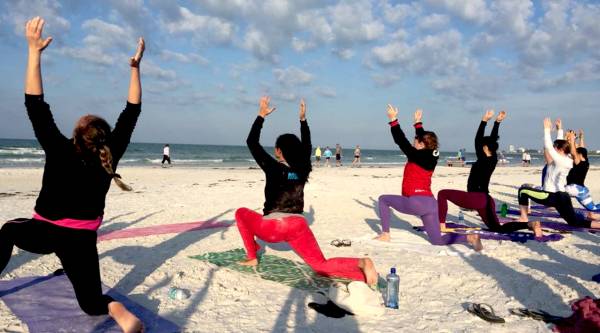In the last couple of articles I wrote, the focus was on dealing with trauma—in particular divorce and how exercise was a helpful form of therapy for a number of reasons. Intense exercise creates a physical outlet for all those not so positive emotions we may be feeling and also helps to put us in the present moment by being focused on the task at hand. If we are in the present moment then we can’t dwell on the past or worry about the future, right?
Being in the present moment is a very powerful thing and can help us on so many levels. Aside from dealing with trauma or divorce, being in the present moment can help us deal with the hectic pace of our current lifestyles were we can often feel stressed, over-worked, and overwhelmed. Sometimes it feels like there is just not enough time in the day to get everything done. And today with social media and the internet, people expect answers right away. In this day and age it can be very hard to switch off. The constant stress can make us unhappy, frustrated, and can even make us sick.
There are ways to help deal with the stress and being in the present moment is one of the best ways. One way to get there is via meditation.
The Power of Meditation
Meditation is an extremely effective method of training the mind. It calms the mind, allowing it to become more focused. Our brain operates on various different frequencies depending what state we are in. When we are awake, our brains are usually operate in beta waves, and while sleeping low-frequency delta waves are produced.
While we meditate our brains are in a state of predominantly alpha waves and also in theta waves. Studies have shown that alpha and theta brain wave states achieved during meditation make a person more relaxed but also very aware and alert.

How to Meditate
Meditation allows us to to clear our mind by eliminating all the mental chatter, the unnecessary worry, and the stress and to reach a state of stillness and deep peace. There are many different methods of meditation, but the simplest way to reach this peaceful state is to focus entirely on the body and the breath in the present moment which is known as “mindful meditation” (or “focused attention”). Our breath is one of the only things that is autonomous that we can actually control.
- Start by finding a comfortable place to sit or lie down without being distracted.
- Close your eyes and inhale slowly for a count of 6-8 and exhale slowly for a count of 6-8.
- When you inhale imagine that you are breathing in clean, light air/energy and when you are exhaling, you are releasing dark air/energy that your body needs to clear itself of.
- Keep breathing, focusing on only your breath while trying to relax every part of your body. Visualize moving down your body from the top of your head down to the tips of your toes. As you move through each part of your body, allow for the relaxation to set in.
- Enjoy the stillness. If a stray thought comes into your mind push it out again and re-focus on your breath.
Benefits of Meditation
Deep, calm, and purposeful breathing has been shown to relax our bodies by slowing down your central nervous systems (which are usually hyper charged from all the stimuli), which reduces stress. Meditation has been shown to repair the central nervous system just like a good, deep night’s sleep. Reduced stress also means lowered cortisol levels and lower blood pressure. By concentrating on your breath, observing each inhalation and exhalation, and without consideration to other thoughts, your mind can become calm. When a stray thought arises be quick to recognize it and then turn your attention back to your breathing.

At the lifestyle camp I recently taught in Sarasota, Florida—all the ladies who attended enjoyed sunrise yoga at the beach.
Discipline Your Mind and Reap the Benefits
Meditation is hard work and it takes a lot of practice to get better, just like training the body. The more you do it, the easier it becomes to stay focused. Progress can be measured by how long a single thought can be focused upon without straying. The benefits of finding time to meditate, even only for 15 minutes a day, are astounding for both the body and the mind. Meditation can assist in feeling peaceful, happy, and healthy, and can train the mind to stay focused, resilient, and strong. Meditation is helpful when dealing with trauma or when you an are athlete and need to push yourself to your physical limit.
There are active forms of meditation that puts your minds into that ‘zen’ state where you are clear of mental chatter, completely focused on the task at hand, and in the present moment.
Yoga is a great example of active meditation. Breathing while moving your body through the poses connects your mind and your body while you are in the present moment.
Some other forms of active meditation are:
- martial arts
- swimming laps
- jogging or walking
- surfing
- tai chi
- weightlifting
You Must Make Time
What is important is that you take time out from your busy schedules and fast paced lives to dedicate some time just for yourself and focus on your mental state. Whether you prefer a still, quiet form of mediation or an active form of meditation through yoga or an intense roll at jiu jitsu class, the aim is to be focused on the present moment, to quiet the mind of all inconsequential mental chatter, and be in a state of peace.






